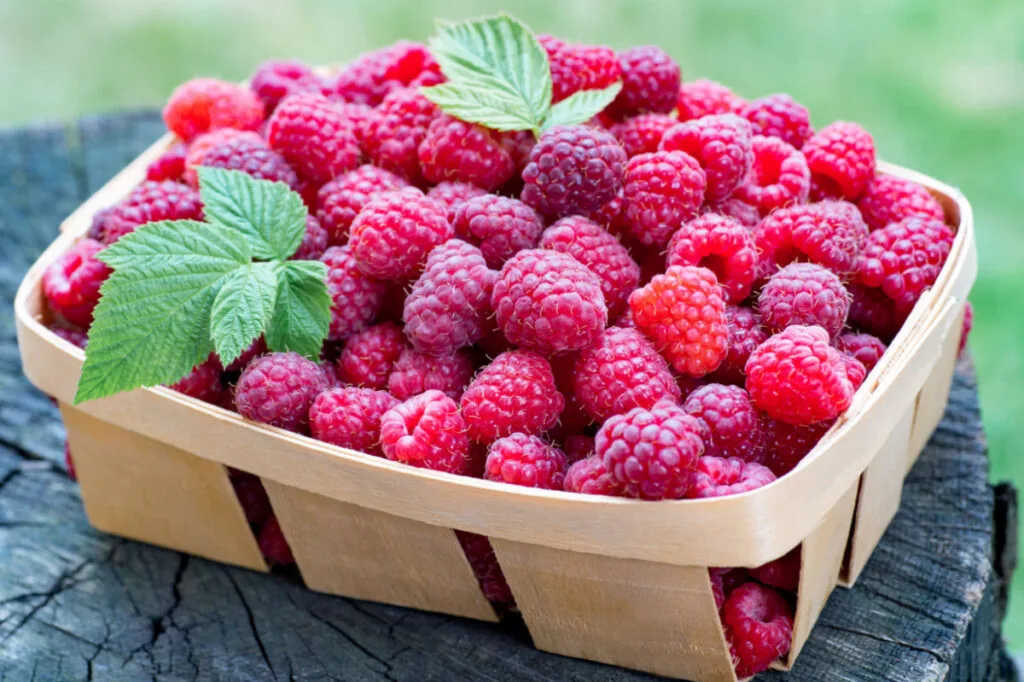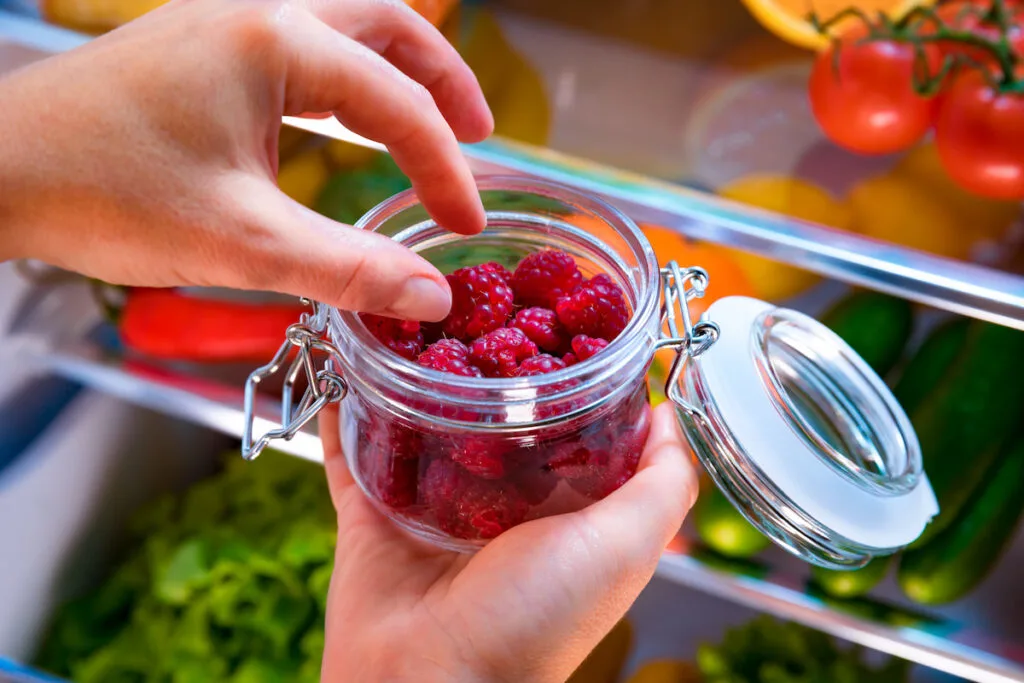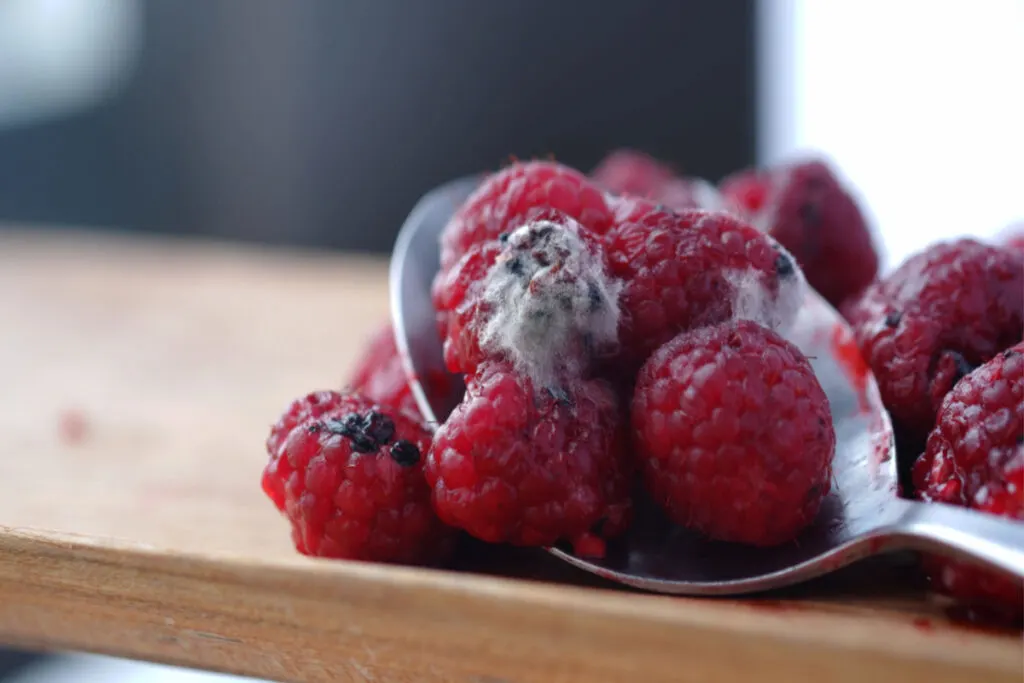Raspberries are a kind of “soft” fruit. They are luscious, juicy, and delicious. This sweet fruit comes in various colors—red, purple, black, orange, amber, and even pale yellow, although they are most popular in red.
Because they are very delicious and versatile, we can get tempted into buying more than we can consume at once and then worry about how long the raspberries will last or how to preserve them.
Unfortunately, raspberries are highly perishable and can spoil in 1–2 days if not properly handled and stored.
However, with the proper methods, you can preserve them for longer than 2twodays, and we’ll explore those methods in this article.
So, if you’re wondering how best to preserve your raspberries, keep reading!
Check out the table below for a brief overview of how long raspberries last under different storage conditions.
| Raspberry | Freezer | Fridge | Countertop |
| Raw/Uncooked | 6–12 months | 3–5 days | 1–2 days |
| Processed/Cooked | 6 months | 2–3 days | 1–2 days |

Table of Contents
What Affects the Shelf Life of Raspberries?
There are several pre- and post-harvest factors that can shorten or extend the shelf life of these berries.
For example, suppose the berries have been exposed to extreme weather conditions or pest infestations before harvesting. In that case, they naturally will not hold up for longer than a few hours or a day after harvesting.
Other factors that can affect the shelf life of this fruit include the following:
• Ripeness
Fully ripe raspberries will have a shorter shelf life than those that are unripe.
This is because the ripe ones are softer and more fragile, making them more susceptible to damage and spoilage.
• Handling
Improper handling of raspberry fruit can lead to it being bruised, cut, or damaged. This can then facilitate mold growth or bacterial contamination, leading to spoilage.

How Can I Store My Raspberries Properly?
Proper storage methods are essential to preserve raspberries. Being a highly perishable fruit, a few measures must be taken before storing them.
The first step to storing your raspberries properly is to ensure that they are clean and dry.
To do this, rinse them under cool water. Only rinse them when you are about to eat, store, and use them.
Avoid soaking them in water to prevent them from spoiling faster.
Pat them dry with a clean paper towel to remove excess moisture.
Storing Raspberries at Room Temperature
It’s important to note that storing raspberries at room temperature only preserves them for a day or two. This is because warmer temperatures speed up the ripening process of the fruit and facilitate decay.
To store at room temperature, ensure that you:
• Use a Breathable Container
Store your raspberries in a container that allows for air circulation, such as a mesh bag or basket.
Avoid using airtight containers, as they can trap moisture or build up heat and cause the berries to spoil faster.
• Keep Them Cool
Store them in a cool, dry place, away from light sources and heat. A pantry or cupboard is a good option. They are still likely only to last a day or two, however.

Storing Raspberries in a Fridge
This method is the most common way of storing berries. Raspberries stored in the fridge can last 3–5 days or even a week if stored properly.
To properly do this,
• Choose the Right Container
A shallow glass bowl with a lid or breathable produce bag is more appropriate and allows air circulation.
Avoid stacking or packing your raspberries too tightly, as this can cause them to be crushed and thus spoil faster.
• Use Paper Towels
You can place paper towels around the base and sides of the container to absorb moisture and prevent the berries from growing moldy.
• Store Them in the Back
Avoid storing your raspberries in the door, top shelf, or front row of the fridge. These areas experience lots of temperature fluctuation, so storing them there can lead to spoilage.
Store them in the back of the fridge, which is the coldest part.

Can I Freeze Raspberries?
Raspberries can be frozen. Freezing them is a good option if you have more berries than you can eat in one day or if you intend to use them in your smoothies or shakes.
Here’s how to properly freeze your raspberries:
• Clean the Berries
You must ensure the berries are thoroughly cleaned and dried before freezing them. This reduces the risk of microbial growth and contamination.
• Spread Them on a Baking Sheet
First, line the baking sheet with either parchment paper or other suitable alternatives.
Next, spread the berries on a single layer on the sheet, ensuring they do not touch each other.
• Freeze
Place the berries in the freezer and freeze until solid. This usually takes a few hours or a day.
• Transfer and Re-Freeze
When the berries are frozen, take them out and put them in an airtight container or freezer bag, then return to the freezer. Deflate the bag as much as possible to get rid of trapped air.
Frozen raspberries kept consistently at 0°F can last 6–12 months. However, freezing them can alter the consistency of the fruit and make them softer when they thaw.

Can I Dehydrate Raspberries?
You can dehydrate raspberries and preserve them for extended periods.
Dehydrating berries is a straightforward process, and here’s how you do it:
- Clean and dry the berries.
- Place the berries on a tray or lined baking sheet.
- Preheat your oven or dehydrator to the lowest heat possible.
- Place the berries in the oven or dehydrator and allow them to dry out slowly
- When they are dry enough, remove them and let them slowly cool.
- Move them to an airtight container and store them in a cool, dry place.
Dehydrated berries can be used as snacks or toppings in cereals, yogurts, or baked goods.
How Does Vinegar Preserve Raspberries?
A vinegar soak is believed to reduce the microbial load on raspberries, remove bacteria and fungi, and thus prolong the shelf life of the fruit.
Here’s how to use vinegar to preserve raspberries:
- Mix 1 cup of vinegar into 3 cups of water.
- Let the berries soak in the solution for 5 minutes.
- Thoroughly rinse the berries with cool, fresh water and pat dry with a clean paper towel.
- Once dry, put them in a breathable container and put them in the fridge.
It’s important to note that though we can extend the shelf life of this delicious fruit with a vinegar wash, it might alter the taste of the fruit.

When Should I Throw Out My Raspberries?
Knowing when to throw out berries is important to avoid consuming spoiled or moldy food that can cause foodborne illnesses.
These are the things to look out for:
• Appearance
Check the total appearance of the fruit. Please discard if there are any dark patches, signs of mold growth, or rot.
• Smell
Raspberries have a natural fruity and slightly sweet scent. If the smell seems off or unpleasant, discard the fruit.
• Taste
If the fruit has an off-taste or sour taste, it indicates spoilage, and the fruit should be discarded.

Final Thoughts
Although raspberries are highly perishable, they can still be preserved for an extended period. The most effective way is to store them in a fridge or freezer.
You must, however, ensure that they are properly handled before storage to prevent damage and consequent spoilage.
With the guidelines outlined in this article, you’ll be able to properly store and keep your raspberries fresh and juicy.
Enjoy!
Resources
- https://www.masterclass.com/articles/how-to-store-raspberries
- https://recipesandpantry.com/shelf-life/how-long-do-raspberries-last-in-the-fridge
- https://www.plantfoodathome.com/how-long-do-raspberries-last
- https://www.stilltasty.com/fooditems/index/18146
- https://www.driscolls.com/article/best-ways-to-store-raspberries
- https://www.doesitgobad.com/how-long-do-raspberries-last
